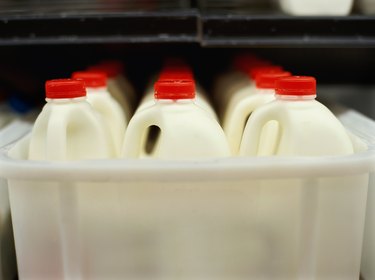
Plastic decking is used in place of traditional wood deck material. Made by a number of manufacturers, the decking is usually a composite of byproducts, such as fly ash and wood, and recycled plastic. Some brands are pure plastic with no other additives. The advertised advantages of plastic decking include resistance to rot, no painting or staining required and high strength in spite of its light weight.
Archimedes
Video of the Day
Objects float because they are less dense than water. Water has a density of 1 gram per cubic centimeter as its official definition. Any material that is lighter than this will be held up by the water to rest on its surface, according to Archimedes' Principle. Vegetative material, such as wood, normally floats, except for the densest types. If the wood stays in the water long enough, the water may seep into the micro-spaces and fill them with water to create a denser structure that then sinks.
Video of the Day
Water Resistance
Because plastic decking is lighter per cubic inch than wood, it will float easily. There are no micro-spaces for the water to seep into, which means that the material will float indefinitely. If the decking is all-plastic, then its resistance to rot and mildew allows for its use in docks and other areas where there is constant water contact.
Composite Problems
With plastic decking's high level of water resistance, it makes it a good choice for building along coasts and in humid regions where moisture can quickly warp and rot wood. However, if the deck is a composite wood product, then there may be a problem with the wood portion of the material that can still attract mildew and mold. If the material is treated by the homeowner like wood, rather than plastic, with periodic cleaning and mildew removal, there should be little problem.
Winter Concerns
Lightweight deck material has its disadvantages as well. A reoccurring problem in areas with severe winters is frost heave when the water in the ground turns to ice, expands upward and pushes any objects in its path out of the ground. A lightweight building structure, such as a deck made from composite instead of heavier wood, has a greater chance of being forced out of position. It's important that all decking structures be properly secured with a solid foundation in areas subject to cold winters.